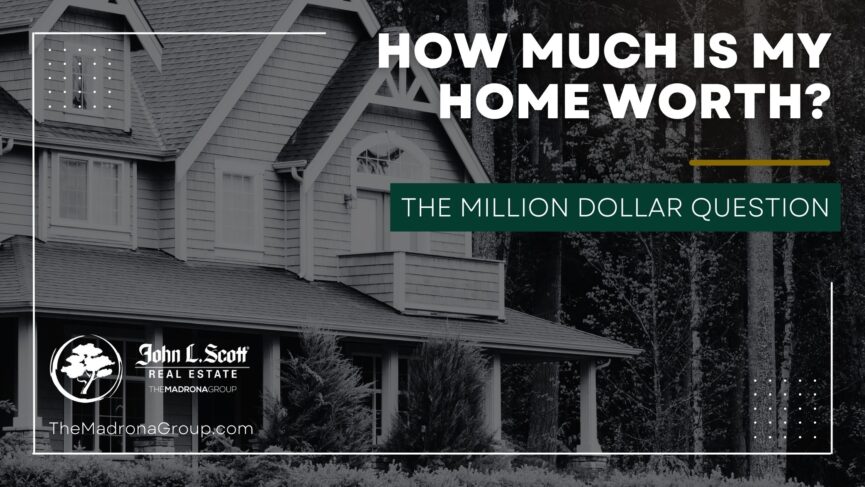You’re sipping your morning coffee, scrolling through your phone, and it hits you—maybe it’s time to sell your home. But then a bigger question pops up, “How much is my home worth?” It’s a common question that homeowners face.
Getting your home’s value right could mean the difference between a quick, profitable sale and your property languishing on the market collecting Collective Days On Market. Lucky for you, we’re about to delve into the nitty-gritty of home valuation and make you an unofficial expert. Ready? Let’s go!
Here’s a interesting statistic: According to a study, nearly 60% of homeowners believe their house is worth more than it actually is. Imagine selling your biggest investment based on an inflated figure! Yikes!
When we talk about “how much is my home worth,” we’re essentially discussing the market value of your property. This is not a number pulled out of thin air; it’s a meticulously calculated figure that considers a variety of factors. Think of it as the price tag the housing market would slap on your home if it could talk.

The Myth and Reality of Zillow Zestimates
If you’re like most people, you’ve probably checked Zillow for a quick home valuation. While Zestimates are a decent starting point, let’s remember they’re crafted by algorithms, not human experts who walk through your home, smelling the fresh paint or hearing the creaky third step on the staircase.
Here’s the kicker—these Zestimates can be off by as much as 10%. That could mean missing out on thousands of dollars when selling your home!
Why Algorithms Can’t Tell the Whole Story
Algorithms are smart, but they’re not clairvoyant. They can’t appreciate the custom Italian tile work in your kitchen or the incredible view from your backyard. Relying solely on algorithmic valuations could set you up for some serious disappointment.
Digital Valuation Platforms: A Double-Edged Sword
Beyond Zillow, there’s a plethora of websites offering home valuations. While they can offer a ballpark figure, they shouldn’t be your end-all solution. Just like with Zestimates, these sites utilize algorithms and databases—they don’t replace the nuanced perspective that a real estate professional brings to the table.
Why Second Opinions Matter
Don’t just trust a single number from a website. Consult professionals to triangulate the most realistic valuation for your home, so you don’t undersell yourself or scare away potential buyers with an inflated asking price.
The Role of Appraisers in Home Valuation
Appraisers are trained professionals who physically assess your home to determine its value. This process is more accurate and customized compared to online platforms. However, appraisers are trained to look at the data, facts and features. Focusing more on square footage than spring market conditions. Looking at number of bedrooms rather than number of competing homes on the market.
The art of selling a home starts off as a logical decision based off of data. Along the way emotions become involved and that is where Algorithms and appraisers can miss the mark.
The Lender’s Perspective
You should know that most lenders require an official appraisal to finalize a mortgage. Meaning that they will hire an appraiser to ensure that the agreed upon price between the seller and buyer matches the appraised value of the home.
Tax Valuation: A Misleading Metric
Your property’s tax valuation can be dramatically different from its actual market value. Remember, tax valuations are designed to calculate your annual property tax and not to provide an accurate market value for your home.
Being uninformed about the difference between tax valuations and market value could be a costly mistake. Make sure you understand the nuances before you slap a price tag on your home.
The Art and Science of Comparable Market Analysis (CMA)
In real estate lingo, a CMA is essentially a detailed comparison between your home and similar properties that have recently sold in your area. This analysis is often the most reliable method to set an accurate asking price for your home.
It’s not just about square footage or the number of bedrooms and bathrooms. A good CMA will consider things like the condition of the property, any recent renovations, and even the reputation of the neighborhood to provide a more holistic valuation.
Market Trends
Did you know that real estate markets can be seasonal? Or that an influx of new jobs in your area can suddenly push up the demand for housing? These market conditions and trends can significantly impact your property’s value.
Keeping your finger on the pulse of the real estate market will enable you to time your sale perfectly. Knowing whether you’re in a buyer’s or a seller’s market can also help you set the right price for your home.
3 Key Indicators
- Sales Activity Intensity
- The percentage of new listings that come on the market and go pending within the first 30 days
- This metric shows the speed at which the market is moving
- A fast market indicates a Seller’s Market
- A slow market indicates a Buyer’s Market
- Monthly Inventory Level
- The number of months of Inventory that is on the market
- 0-3 Months supply indicates a Seller’s Market
- 3-4 Months indicates a Nuetral Market
- 4+ Months supply indicates a Buyer’s Market
- The number of months of Inventory that is on the market
- Interest Rates
- The current interest rate can be a good metric to how motivated buyers are
- 3-5% Buyer’s are extremely motivated
- 5-7% Buyer’s are somewhat motivated
- 8+ Buyer’s are less motivated
- The current interest rate can be a good metric to how motivated buyers are
Understanding these key indicators can be very helpful in understanding how to price your home.
3 Factors To Selling a Home: Location, Condition and Price
The Pivotal Role of Location in Home Valuation
You’ve heard it a million times: “Location, location, location.” It’s the golden rule of real estate for a reason. The neighborhood and broader area where your home is situated have an outsized impact on its market value, often more so than any renovations or improvements you could make to the property.
Factors such as:
- The size of the lot
- How flat it is
- Does it have a view
- Is it secluded
- Is it on private street or cul-de-sac
Can cause a home to be more or less desirable.
Zip Code Influence
The significance of your zip code can’t be overstated. A highly-regarded zip code not only means higher property values but also suggests better schools, more convenient amenities, and lower crime rates. It’s common to see staggering price differences between homes that are just a few miles apart but separated by a zip code boundary.
Proximity to Amenities
Your homes Walkscore or closeness to shopping centers, parks, and recreational areas generally makes a location more desirable. It’s not just about the convenience of a quick grocery run; it’s about the lifestyle that the location offers.
Buyers are willing to pay a premium for homes that allow them to live the way they want to live, whether that means being close to:
- Trendy shops
- Good schools
- Outdoor amenities like parks and lakes
- Popular pubs and eateries
- Gyms and studios
Commute and Transportation
For many buyers, especially those in Seattle or Belleuve, a short commute can be a major selling point. Easy access to public transportation or i-5 or I-405 can significantly boost a home’s value. Even if the buyer doesn’t commute, the option to do so efficiently can be a big draw.
Future Developments
When evaluating a location, savvy buyers are not just looking at what’s around right now but what will be around in the future.
Planned developments like
- The Light Rail
- Lynnwood Towncenter
- New schools
- Mountlake Terrace Town Center
Can exponentially boost a home’s value over time. However, the reverse is also true; be aware of any proposed changes that could negatively impact property values, like industrial sites or high-rise buildings that might obstruct views.
The Undeniable Impact of Your Home’s Condition
When it comes to determining your home’s worth, condition plays a monumental role that simply can’t be ignored. Unlike fixed factors such as location or lot size, the condition is something you have control over, and improving it can yield tangible financial rewards.
The Tale of Two Houses
Imagine two homes situated side by side in the same neighborhood—same square footage, same number of bedrooms and bathrooms, and even the same charming street view. One, however, is a turnkey property, updated and well-maintained.
The other has peeling paint, an unkempt garden, and interiors that scream ‘70s chic. It doesn’t take a real estate genius to figure out which property would be valued higher.
The better-maintained home could fetch as much as 10-20% more than its less appealing counterpart.
Upgrades That Pay Off
If you’re contemplating selling your property, consider investing in renovations that add value. The key is to focus on improvements with high returns on investment (ROI). According to studies, kitchen and bathroom renovations can offer up to an 80% ROI. Even less expensive upgrades, such as installing energy-efficient windows or upgrading insulation, can significantly elevate your home’s worth.
The Power of First Impressions
Never underestimate the impact of curb appeal. Prospective buyers often make judgments within the first few minutes of seeing a property. Simple improvements like fresh exterior paint, manicured lawns, and modern landscaping can elevate your home’s worth and make it stand out in a crowded market.
Final Thoughts on How Much Is My Home Worth?
By now, you’re practically a walking encyclopedia on home valuation. You’ve got the tools, the insights, and the knowledge to tackle that million-dollar question: “How much is my home really worth?”
Remember, a home’s value isn’t just about crunching numbers or following trends. It’s a complex equation that factors in everything from your home’s physical condition to the state of the broader real estate market.
If you’re serious about getting the most accurate valuation possible, consult with the pros. Until then, happy pondering, future home sellers!
Share this post!




